Mass. lawmakers: Immigrants can plug gaping labor force voids
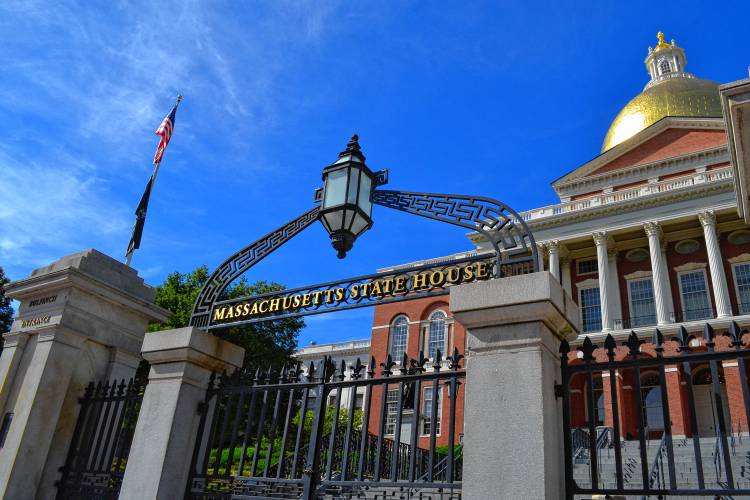
The Massachusetts State House in Boston. FILE PHOTO
| Published: 09-21-2023 4:45 PM |
With Massachusetts straining under an overburdened emergency shelter system and staring down a shortfall of workers, more than 60 lawmakers are sending a letter urging the White House and Congress to work quickly to find a bipartisan solution that can address the “dual crises of a dysfunctional immigration system and a rapidly-devolving domestic workforce shortage.”
Spearheaded by Senate Dean Marc Pacheco of Taunton and signed by a bipartisan clutch of 64 legislators, the letter makes the case that Massachusetts’ state of emergency — declared last month as the combination of homeless families and immigrants newly arriving to the country pushed the emergency shelter system to its limits — is the result of decades of federal inaction around immigration policy and federal foot-dragging when it comes to clearing immigrants to work here.
With plentiful hyperlinks and a blend of specific national and Massachusetts data points, the letter makes the case that the American economy has come out the other side of the COVID-19 pandemic showing its resilience, but that Washington D.C. needs to keep a more active hand on the tiller as companies of all sizes struggle to find enough workers to keep that momentum going.
“Virtually every sector of the United States economy, however, is now grappling with ongoing labor shortages. According to the latest population and demographic data, these shortages will continue to stunt our growth and become even more urgent if left unaddressed,” the legislators wrote. “At the same time, our outdated federal immigration system is in desperate need of reform. Our country needs a functional gateway at the border that safeguards our national security from illegal entrants while providing noncitizens seeking lawful entry a practical means of obtaining approval to reside and find gainful employment.”
The letter from lawmakers mirrors efforts that the Healey administration has undertaken to convince federal policymakers that they need to help states like Massachusetts where shelter systems and public programs are being squeezed in part because of an influx of newly arriving immigrants. Massachusetts can only do so much, the governor and lawmakers argue, when the root causes of the problem are firmly within the federal government’s purview.
As of Tuesday, there were 6,528 families housed in hotels and emergency assistance shelters, according to Healey’s office. That’s a nearly 18% increase since Aug. 6, two days before Healey declared a state of emergency around the crisis. The governor said Wednesday that close to half of the roughly 22,000 people housed in the state’s shelter system are new arrivals from other countries, up from about one-third weeks ago.
In Greenfield, 45 families, for a total of 143 immigrants and refugees, are currently residing at The Days Inn. Of those, 78 are adults and 65 are children, and about 55% are Haitian refugees.
In the challenge of sheltering all the new arrivals, the lawmakers said they see an opportunity to address the persistent labor shortage that frustrates businesses here and threatens to stall the state’s progress on a number of fronts.
Article continues after...
Yesterday's Most Read Articles
 Greenfield homicide victim to be memorialized in Pittsfield
Greenfield homicide victim to be memorialized in Pittsfield
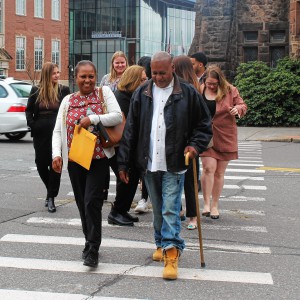 Former Greenfield man granted new trial after 1995 murder conviction, walks free
Former Greenfield man granted new trial after 1995 murder conviction, walks free
 On The Ridge with Joe Judd: What time should you turkey hunt?
On The Ridge with Joe Judd: What time should you turkey hunt?
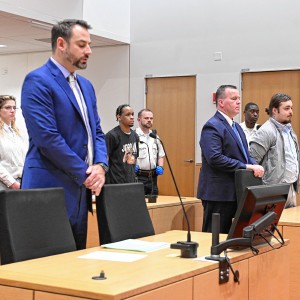 Judge sets bail for Millers Falls assault suspects
Judge sets bail for Millers Falls assault suspects
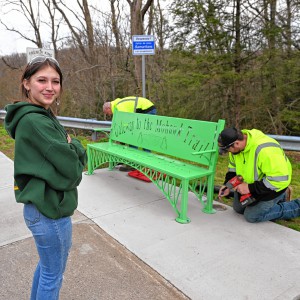 Franklin Tech student welds artistic bench for French King Bridge
Franklin Tech student welds artistic bench for French King Bridge
 As I See It: Between Israel and Palestine: Which side should we be on, and why?
As I See It: Between Israel and Palestine: Which side should we be on, and why?
Massachusetts currently has 92,049 workers available for 243,000 vacant jobs and only 47 workers available for every 100 job openings, according to the United States Chamber of Commerce. And nationally there are 9.8 million job openings and only 5.9 million unemployed workers.
Nearly all transit agencies reported experiencing a workforce shortage in a late 2022 survey, the lawmakers noted, and 84% of agencies said the shortage is affecting their ability to provide service. The Health Policy Commission reported vacancy rates in 2022 of 56% for licensed practical nurses, 32% for mental health workers and 13.6% for registered nurses. And the Massachusetts Clean Energy Center said this summer that 38,100 more workers need to be trained and ready to work on climate projects if the state is going to meet its 2030 emissions reduction requirement.
And Massachusetts isn’t producing as many workers as it used to. Citing the National Center on Health Statistics, the lawmakers said that the national fertility rate has fallen 15.9% from its average between 2000-2010 and the Massachusetts statewide birth rate has fallen 28.1%; since 1990, “and demographic data collectively indicates critical workforce shortages are on pace to continue to grow.”
But while the combination of people seeking authorization to enter the United States and undocumented immigrants already living here “represent an abundance of potential employees for our domestic workforce,” both the economy and nature of immigration have changed dramatically since the last comprehensive immigration reform act was passed by Congress in 1986, the state legislators said.
The H-1B employer-sponsored immigration system, which authorizes temporary work in cases when employers cannot otherwise obtain needed business skills or abilities from the U.S. workforce, is subject to an annual limit of 65,000 visas (plus 20,000 more for foreign professionals who graduate from U.S. institutions with advanced degrees) established in 1990. Since then, the size of the U.S. economy has more than quadrupled from roughly $6 trillion to more than $25 trillion, according to World Bank Open Data, and the Cato Institute said there were nearly 1.44 million employment-based skilled-worker immigration applications stuck in processing backlogs as of September 2021.
A record 2.4 million undocumented immigrants were apprehended at the U.S. border in fiscal year 2022, according to the United States Customs and Border Protection. The U.S. Department of Homeland Security projects that the population of undocumented immigrants living in the U.S. is roughly 12 million people, and more than 5.2 million applications for every form of legal immigration are pending, according to U.S. Citizens and Immigration Services.
“According to a recent Center for American Progress report, providing a pathway to citizenship for eligible and undocumented workers would boost the Gross Domestic Product of the United States by a cumulative total of $1.5 trillion over 10 years and create 400,800 new jobs,” the Massachusetts lawmakers wrote.
So far, state government efforts to compel the White House and Congress to act have not been successful. Healey said Wednesday that her office has not heard back from the feds “to our satisfaction.”
“We need, not just answers, we need response, we need action. And we’ve given them exactly what they need to do. My letter to the White House could not have been more clear in terms of simple steps that could be taken to address this. Also, Congress has an opportunity to act but so far, they’re not willing to,” the governor said. “And we need money. I mean, in talking to my colleagues, other governors across this country, other states, I mean, we’re all feeling it. And, frankly, we’re just having to foot the bill. And it is a big bill to take care of folks who are in this situation. It is the direct failure of the federal government.”

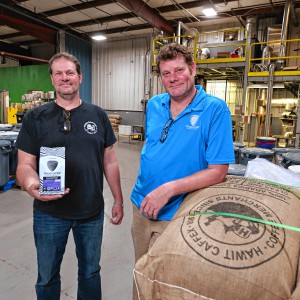 Fogbuster Coffee Works, formerly Pierce Brothers, celebrating 30 years in business
Fogbuster Coffee Works, formerly Pierce Brothers, celebrating 30 years in business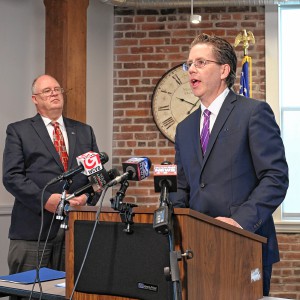 1989 homicide victim found in Warwick ID’d through genetic testing, but some mysteries remain
1989 homicide victim found in Warwick ID’d through genetic testing, but some mysteries remain Doors open at Tilton Library’s temporary home at South Deerfield Congregational Church
Doors open at Tilton Library’s temporary home at South Deerfield Congregational Church DA to announce breakthrough in 1989 unsolved homicide in Warwick
DA to announce breakthrough in 1989 unsolved homicide in Warwick
